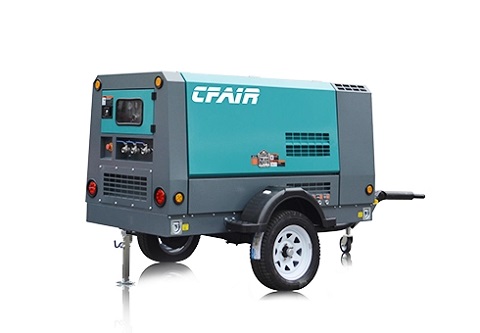When it comes to keeping your CFAIR portable diesel air compressor in top working condition, regular maintenance is key. By following a few essential maintenance tips, you can not only extend the life of your equipment but also ensure it performs efficiently whenever you need it. Here, we've outlined four crucial areas you should focus on to maintain your portable diesel air compressor.
The first step in maintaining a portable diesel air compressor is regular inspection and cleaning. Dirt, dust and debris can clog the filter and impair the compressor's function. So we need to check the air filter regularly. The CFAIR brand has a strict schedule for the maintenance time of the air filter. Please Clean Air Filters when the air compressor has been running for 100 hours, Replace Compressor Primary Air Filter when it has been running for 1000 hours, and Replace Safety Air Filter when the air compressor has been running for 2000 hours. Keeping the air filter clean ensures that your equipment runs smoothly and remains efficient.

For your CFAIR portable diesel air compressor to function optimally, it's crucial to monitor and maintain appropriate fluid levels. This includes engine oil, coolant, and diesel fuel.
Engine Oil: Regularly check the oil level and top it up if necessary. Also, be sure to change the oil and oil filter at recommended intervals. Clean engine oil ensures that all moving parts are well-lubricated and reduces the risk of mechanical wear.
Coolant: The coolant level should also be checked frequently. Adequate coolant levels prevent the engine from overheating, thus extending its lifespan.
The battery is another essential component of your portable diesel air compressor that requires regular attention. A weak or dead battery can halt operations at critical times, causing unnecessary delays and repairs.
To maintain battery health:
Keep the battery terminals clean and free of corrosion.
Ensure that the battery is fully charged. A trickle charger can be beneficial for maintaining the charge during periods of inactivity.
Inspect the battery for any signs of damage or leaks, and replace it if needed.
While regular self-maintenance is invaluable, it's also important to schedule professional inspections of your CFAIR portable diesel air compressor including the 185 CFM air compressor for sale. A qualified technician can identify potential issues that might not be evident during routine checks.
Professional inspections should cover:
A thorough examination of the engine, including the fuel system, ignition system, and exhaust system.
A detailed inspection of the compressor unit, including the belts, pulleys, and valves.
Diagnostic tests to ensure all electronic components and sensors are functioning correctly.
A professional can also provide valuable insights and recommendations on any replacements or upgrades that can improve the unit's performance and longevity.
Maintaining your CFAIR portable diesel air compressor doesn't have to be a time-consuming or complicated task. By following these simple tips—conducting regular inspections and cleanings, monitoring fluid levels, maintaining battery health, and scheduling professional inspections—you can ensure your equipment stays in top condition. Remember, a well-maintained compressor is not only more efficient but also more reliable, ultimately saving you time and money in the long run. So take the time to care for your portable diesel air compressor, and it will serve you well for years to come.
CFAIR recommends some popular products on the market based on customers' actual applications and offers customization services according to specific customer requirements. Simultaneously, CFAIR is committed to customizing machinery based on customers' specific needs. Whether customers require solutions tailored to special environments, specific flow rates, or customized pressure requirements, CFAIR provides personalized customization services, ensuring that products perfectly meet the practical engineering and application needs of customers. Through flexible customization options, CFAIR offers customers a broader range of choices to meet the requirements of different industries and application fields.